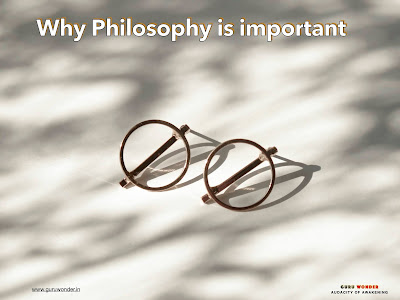Why, Philosophy is Important.
Creation, life, death, the universe, love, hate, jealousy, desire, etc. each one of us countless questions about many aspects of our existence. In a sense everyone at heart is some sort of a philosopher.
We delve into philosophy whenever we can, but the pressures of work, and society, formal education and entertaining ourselves leaves most of us little time to contemplate about or discuss philosophical issues.
Modern existence is focussed primarily on material issues, meaning money and science. It is but natural therefore for the vast majority of people to ask, 'When science provides all the answers, of what benefit is philosophy?'
Today science and its daughters of technology, engineering, mathematics and medicine (STEMM) reigns over our lives, providing us the means to progress materially and economically. We seem to forget that philosophy provides us the soul, the emotional gain and the conscience to experience that progress in a meaningful way.
Philosophy is the delightful pursuit of answers to the question of our existence and millions of its facets, because the questions are more important than the answers. It may take even a lifetime to obtain a somewhat satisfactory answer, but a philosopher deems it worthy.
It is important to remember that all scientific answers started off as philosophical questions. Seemingly slow and placid, philosophy is actually at the forefront of our seeking, Science on the other hand is the conquered territory of answered questions yielded to it by philosophy.
Science provides answers, philosophy the questions.
Science will tell us how to how to live and even kill, but it can never tell us when and why to live and kill.
Science dissects to the smallest possible to see and understand the parts whereas Philosophy seeks to synthesise and unify the whole.
Science without an accompanying philosophy in individuals, families, organisations and even society can only produce wealth but not provide meaning to life. The material world without philosophy is like a one winged bird that will live, maybe even grow fat, and give the impression of thriving, but it will never be able to fly leave alone soar.
Where does one learn philosophy?
Schools driven purely by economics and science don't have the time nor the desire to teach philosophy. Neither can one get it at work nor from the media.
Libraries are a good source, and the internet can provide good sources and materials.
All these platforms tend to be monologues and that can never be satisfying.
Philosophy is about questions and answers about life and living, and therefore it is best learnt and appreciated through dialogue. Social dialogue, and discussions with family, friends, associates and even strangers is good, but the best of course, is with a philosopher.
Unless one questions, seeks and obtains, then reflects on what has been received, that acquisition of thoughts is useless. Only after we contemplate on the answers can one form a hypothesis on a matter.
Philosophers in their pursuit of understanding and synthesis are seen simultaneously, both as wise, and foolish.
Wise because they ponder and separate the chaff from the wheat, filtering out and presenting great truths.
Philosophers are viewed as great fools for they seem to lack common sense, and an understanding and appreciation of the material world.
Pursuing and indulging in philosophy is what produces and enriches civilisations.
The best time to start becoming a philosopher was yesterday, the second best time is today.


Comments
Post a Comment